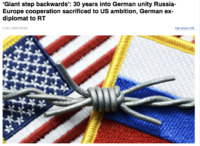RUSS 005 - Omeka Project - Benjamin Rosenzweig
Relations Between Russia and the West:
Amicable Aspirations Doomed By Juxtaposing Ideological Trajectories
Getting Colder … Global Deviation Back to Cold War Politics
Although historians agree that the Cold War concluded with the Soviet Union’s collapse in 1991, Russia’s contemporary conflicts with Western nations are eerily reminiscent of the USSR’s, to the point that it’s increasingly difficult to distinguish between their modern and twentieth-century disputes. Russia’s accelerated nuclear testing and stockpiling as the New START treaty expires directly mirrors the US-Soviet arms race throughout the mid-1900s, and Putin’s conquests of Chechnya and Ukraine (alongside his seizure of influence in other Eastern European lands like Belarus) indicate his desire to rebuild a Russian sphere of influence analogous to the Warsaw Pact that was dismantled alongside the USSR. The consortium of Western (NATO) governments has watched its aspirations to normalize relations with Russia disintegrate over the past two decades of Putin’s rule, as its members’ tenacious efforts to implement democracy time and again prove incompatible with Russian authoritarianism. NATO’s aggressive response to the poisoning of Russian opposition leader Alexei Navalny and Russia’s relentless subversions of America’s democracy and election system are paradigmatic of Russia’s juxtaposing ideological trajectory with the West, and a testament to their mutual fears and ever-deteriorating relations.
I understand why [Putin] has to do this — to prove that he's a man. He's afraid of his own weakness." — Angela Merkel
Members of NATO demonstrated their disdain for and fear of Russia through sweeping sanctions and condemnations following evidence that the Kremlin was accountable for Alexander Navalny’s poisoning, highlighting the stark moral and political divides as well as the growing mistrust between Russia and the West. In an open letter to the Russian Federation on October 2, 2020, five European members of the UN Security council demanded Russian transparency about the Navalny poisoning, emphasizing that Russia’s dishonesty and use of chemical weapons (in this case a “Novichok” agent) is “a threat to international peace and security.”[1] Two such members—France and Germany—ultimately sanctioned Russian agents whom they believed responsible for the ordeal, and Russia swiftly responded with its own sanctions. The demand for transparency elucidates NATO’s phobia and mistrust of the Kremlin, and the “threat to international… security” statement touches on their deep-rooted moral and military disagreements.[2] Though the Western countries aren’t hypocritical in their demand for transparency per se, France was perhaps too transparent with regards to Macron and Putin’s diplomatic phone discussion about the Navalny crisis in late September: French newspaper Le Monde leaked their entire conversation, sparking outrage from the Kremlin and helping it justify Russia’s mistrust of Western governments and institutions.[3] Furthermore, the exchange of sanctions exhibits the strong political contempt that renders both sides obligated to punish each other despite negative ramifications; neither side benefits from sanctions. As chemical weapons and media gaffes dwindle trust and economic ties between NATO and its historic enemy, the hopes of normalized relations fade alongside them, and the political atmosphere veers ever closer to the unconditional, mutual demonizations that shaped the Cold War.
"Donald Trump is a brilliant and talented person, no doubt." — Vladimir Putin
As the US is a leading voice of the NATO alliance, Russia’s unwarranted involvement in American elections has threatened the security of Western democracy and indicates the Kremlin’s desire to influence the trajectory of American politics under the model of its own autocratic institutions. Ever since American sources discovered Russia’s meddling in the 2016 US Election in favor of Donald Trump, the US has imposed a plethora of sanctions on responsible officials and continues to seek those responsible through the guidance of the Steele Dossier, the leading report on Russia’s election misconduct.[4] As the Democratic party has ramped up its anti-Russian rhetoric over the past decade—generally as a response to Putin’s authoritarian tendencies—Russia presumably aided Trump’s campaign with the hopes of normalizing US-Russia relations, but more by imposing its own Orwellian perspectives on truth (which are evident in Trump’s “fake news” allusions) rather than following the footsteps of American democracy. Four years later, As Biden’s lead over Trump became insurmountable in the 2020 election, the Kremlin doubled down on its delegitimization efforts, with Russian Election Commission deputy chief Nikolai Bulayev (among other Kremlin officials) publicly discounting the mail-in ballot system as “opaque” and “dangerous” as means to undermine the election’s legitimacy, again, in Trump’s favor.[5] However, though Russia and the Trump administration continue to insist that the election was "rigged," the lion's share of investigations has found little to no evidence of widespread voter fraud. Russia’s brazen “Hail-Mary” efforts to echo Trump's misinformation to the American (and Russian) public about the true election results is an attempt to dismantle the strength of US institutions. (Russia has even begun expanding such propoganda directly to American audiences through the spread of its right-wing, state-run "RT News" on American video and social media sites such as YouTube, where it has over four million subscribers, and Facebook, where its "RT America" page alone has over a million followers). By virtue of America's status as a NATO leader, this attack on American democracy emanates throughout the alliance and tangibly threatens democratic values throughout the Western world. But, as Trump’s frivolous lawsuits continue to fail in court, it’s become inevitable that Biden will be the forty-sixth American president starting next year; Russia’s second election interference seems doomed. Especially as a corollary of Russia’s discrediting Biden’s victory and of its threatening the process that permitted his win, American mistrust of Russia now emanates directly from the White House and, consequentially, the Secretary of State. As sanctions and slanders inevitably pile up on each side, the worsening mutual perceptions of each-other as the “enemy” will quash any likelihood of courteous relations, let alone diplomacies.
Chauvinism Through Russian Literature
Although the collapse of the USSR posed dire economic and social consequences to everyone behind the Iron Curtain, the emotional devastation perhaps hit the hardest. With the USSR, Russia’s unbounded influence over the communist “second world” vanished in the early 1990s, and the former Soviets could longer view themselves as a dominant superpower. And, as they had for 70 years been brainwashed to believe in Russia’s transcendent glory and righteousness as the justification for Russians’ inferior living standards to Western societies, this collapse caused a scary and befuddling identity crisis to the Russian people. In response, Vladimir Putin captured this yearning for identity through relentlessly nationalist rhetoric, which has reactivated a strong disdain for the West in the Russian people. In their play Playing the Victim, The Presnyakov Brothers demonstrate this chauvinism through the familial interactions of Valya, the play's protagonist and turn-of-the-century Russian stereotype, whereas Vladimir Sorokin more forthrightly conveys it through laws and his evil yet powerful protagonist Andrei Komiaga’s own thoughts in a dystopic Russian state in Day of the Oprichnik. Both authors use their characters’ nationalism as the vessel through which to elucidate Russians’ condescending and derogatory views of Western nations.
The Presnyakov Brothers demonstrate Russians’ disdain of the West through their characters’ xenophobic (and conspiratorial) tirades and fixations on Russian purity. Valya’s father expresses tremendous disgust upon being reminded of his impure Russian heritage: following Valya’s teasing him about his “German blood calling,” he furiously demands that his son “Leave the f***ing table… Bastard!” (86). Although the father constantly alludes to his disdains for non-Russian cultures, between his anti-Asian slurs (“slant-eyed people” (85)) and his disapproval of Valya’s using chopsticks, his fury upon the thought of being non-Russian most affirmatively proves his nationalist tendencies towards Russia. After all, neither he nor his son expresses any ill-attitudes towards Germany throughout the entire play, barring his outburst at being called a German. But, it is to note that Germany, at this point following the reunification, was considered a Western nation. Though Valya himself never expresses the same chauvinist sentiments rhetorically, he introduces his zany theories about Japan’s secret plan to exact a “great revenge” on America (for the World War II atom bombs) with an eerie indifference. Though this doesn’t indicate aggressive disdain for the US, it suggests that such attitudes are normalized in Russia, and perhaps have been since the late 1940s at the earliest. Though implicit, Valya’s apathy for America’s potential destruction and his father’s disgust at his own (partly) Western blood convey the effects of xenophobia and nationalism on many Russians’ perspectives on Western nations.
In Day of the Oprichnik, the dystopic Russian regime’s foreign policy actions and Komiaga's chauvinism exemplify statewide, anti-Western sentiments. In the novel, Komiaga references a new wall at Russia’s western border that that completely separates it from the “stench and unbelievers” (181) on the other side, clearly refering to the non-Orthodox Western nations. The wall’s uncanny resemblance to the Berlin wall—the physical symbol of Russia and the West’s ideological divides—is no coincidence and signifies the reestablishment of the “second world,” that clashed with the American-led “first world” in the Cold War. The state further shields its people from the West by manipulating the media and prohibiting access to Western radio stations (though Komiaga listens in on occasion). Though in the novel this simply sheds light on more “white terror” combats against Western ideology, it concerningly resembles Putin’s actual media strategies, turning most state-run media sites into Russian (and by the same token anti-West) propaganda machines. And, as a bona fide puppet of the state and an enforcer of its gospel, Komiaga's own nationalism results in his disdain for the Western world. Though these sentiments sometimes arise harmlessly, such as in his convictions in the supremacy of Russian foods and wines over all other nations, they just as often highlight his dystopic glorification of his gruesome Russia, as he seethes at the politics of the Western “Judas” or “liberal” (65) whom he occasionally hears on the illegal radio stations. This exchange highlights the disparity between Western liberalism and Russian ultra-conservatism. And, as the latter is a reflection of the state in addition to just Komiaga, this contrast indicates complete incompatibility between East and West. With the election of Joe Biden in the US and Putin’s continued crackdown on human rights in Russia, the trajectories of the US and Russia seem to perfectly encapsulate the continued deterioration of East-West similarities and relations.
"Anyone who wants to learn more about Russia and what could be the outcome of [Vladimir] Putin's rule should read [Day of the Oprichnik]. It's dark and dystopian, but it's a part of our life." — Garry Kasparov
An Intriguing, Alternative Future
Though Russia-NATO relations seem to be approaching a trough we haven’t seen since the Cold War, rumors of Putin’s imminent health-related retirement could lead to the reversal of some Russian autocratic policies and the amelioration of Russia-West relations. Despite that all signs indicate a United Russia, quasi-Putinist successor to the presidency, it isn’t unheard of in Russian history that a leader disavows his predecessor and implements tangible liberalizations and foreign policy overhauls. Most significantly, Soviet Premier Nikita Khrushchev, a leader of the same Communist party as Joseph Stalin, condemned his predecessor’s atrocities in the Great Terror—virtually eradicating his cult of personality—in a secret speech to the Communist Party Congress in 1956, and three decades later, Mikhail Gorbachev’s “Perestroika” and “Glasnost” exposed the public to the entire array of Stalinist terrors and catalyzed the release of myriad Brezhnev-era political prisoners. But, although both Khrushchev and Gorbachev made gargantuan leaps in the USSR’s human rights, only Gorbachev ramped up dialogue with the US and then-president Ronald Reagan, ending the Cold War, whereas Khrushchev fought numerous political battles with the West (over spy planes and Cuban missiles, to name a few), and in fact oversaw the most uneasy era of US-Russia relations. Although there’s optimism for the former, Putin’s handling of the media has made the whims of the people strongly anti-West throughout, and by synonymizing Westernization with democracy, he justified his authoritarian approach to the Russian public. Leading Russian channels like “Channel One” and “RT News” propagate and perpetuate deep-rooted chauvinism that, to justify the legacy of the USSR, relentlessly criticize American actions (like its opposition of the Nord Stream 2 pipeline) and politics (like its legalization of gay marriage). Even if Putin’s replacement desires to be Gorbachev-esque, he will need not only to democratize Russia and mitigate the risk of NATO condemnations and standoffs, but also to drastically alter his nation’s—most importantly the Duma’s and media’s—general perception of the West to justify an increase in diplomacies. Otherwise, as we saw in Yeltsin’s transition to Putin, and are witnessing in Trump’s American influence, it takes just one powerful nationalist to redefine the sentiments of a nation and deviate back to square one.
[1] https://www.themoscowtimes.com/2020/10/02/europeans-on-security-council-want-russia-explanation-on-navalny-a71626
[2] These disputes are further evident in Russia and NATO’s opposition in the Syrian Civil War, in which Russia supports Syrian dictator Bashar Assad (despite his use of chemical weapons on civilians) whereas Western troops fight alongside the rebels. This is reminiscent of the myriad ideological proxy wars fought between the USSR and USA in Vietnam and Korea, to name a couple.
[3] https://meduza.io/en/news/2020/09/25/france-s-foreign-ministry-investigating-alleged-leak-of-macron-putin-conversation-on-navalny-to-the-press
Works Cited
- Dalton, James, and Oliver Carroll. “Novichok Used to Poison Russian Opposition Leader Alexei Navalny, Germany Says.” The Independent, Independent Digital News and Media, 2 Sept. 2020, www.independent.co.uk/news/world/europe/novichok-alexei-navalny-poison-nerve-agent-russia-opposition-leader-germany-a9701076.html.
- “Joe Biden on Why He Should Be Elected: 'He's Putin's Puppy'.” CNBC Television, 29 Sept. 2020, www.youtube.com/watch?v=I_l2VkTt6x8.
- Ritter, Scott. “On Russia, Joe Biden's Mouth Is Writing Checks the US Can't Afford to Cash.” RT International, 18 Sept. 2020, www.rt.com/op-ed/501103-joe-biden-russia-fbi-election-interference/.
- Sorokin, Vladimir. Day of the Oprichnik. Translated by Jamey Gambrell, Farrar, Straus, and Giroux, 2011.
- The Presnyakov Brothers. “Playing the Victim.” New Russian Drama, edited by Maksim Hanukai and Susanna Weygandt, Columbia University Press, 2019, pp. 57–120.
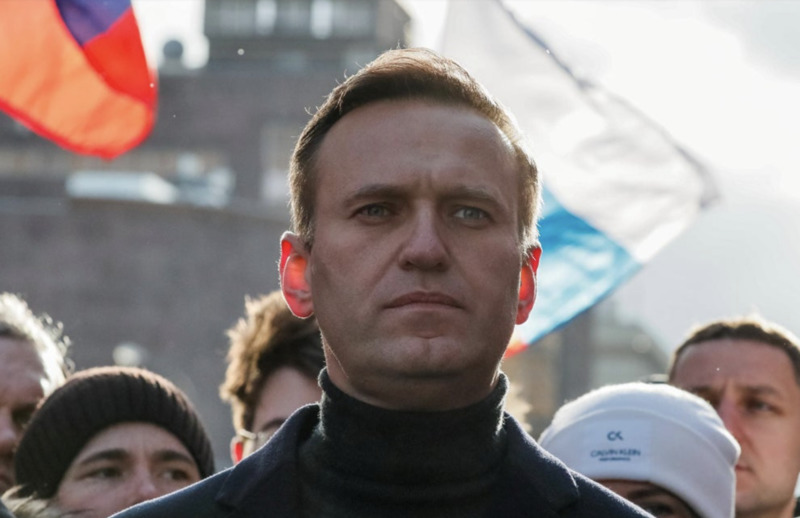
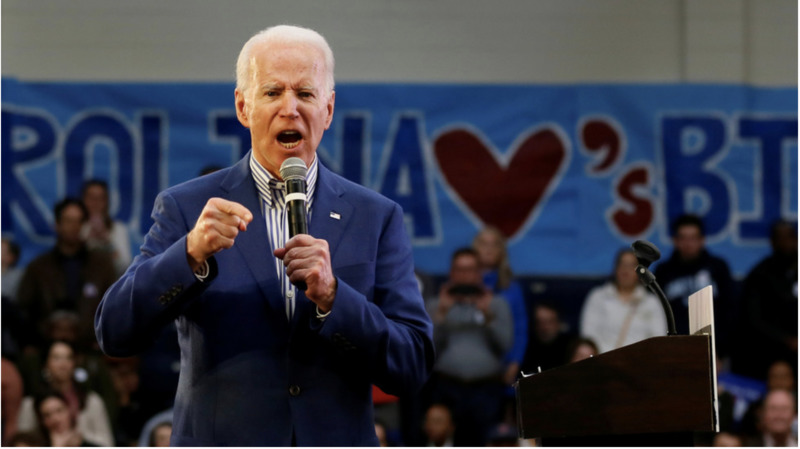
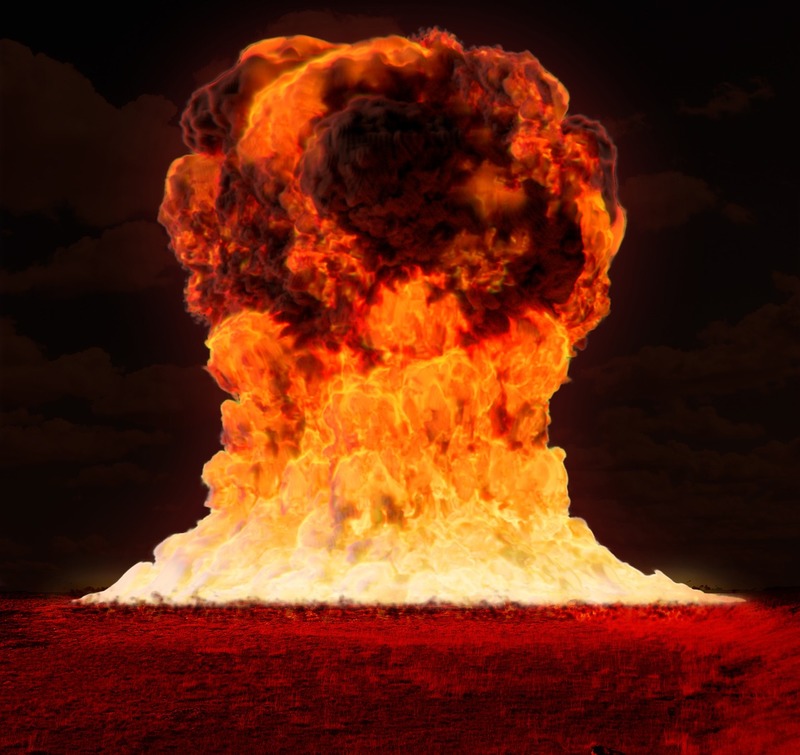
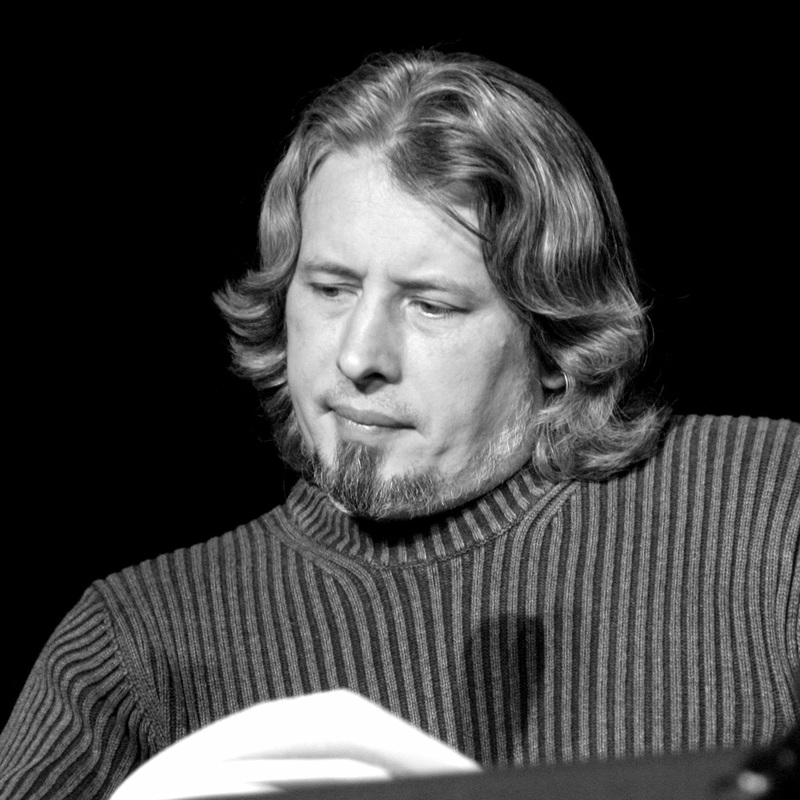
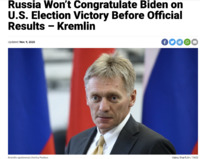
![Nikolai Bulayevand other leading members of Russia's election panel are skeptical of this year's American Election's legitimacy, citing concerns regarding mail-in votes such as “people who are long dead are casting ballots and [] mailboxes are being broken into.” Though presented under the guise of non-bias (for example claiming that both candidates will commence lawsuits), these sentiments wholly echo Donald Trump's attempts to delegitimize the election's results in myriad swing states leaning in Biden's favor.](https://s3.amazonaws.com/sc-lib-ds-omeka-s/medium/add27c1896a888356451a4d447682489d46722f8.jpg)



